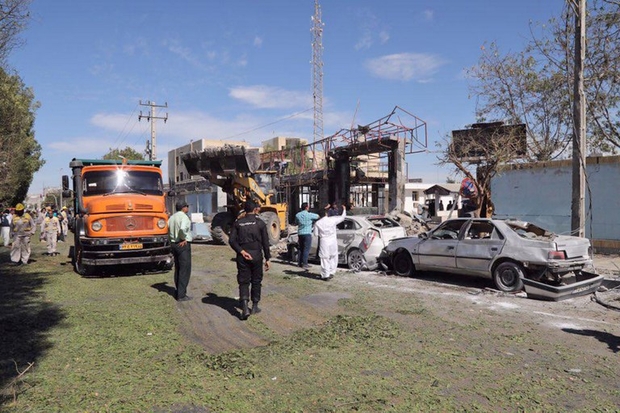A suicide bomber has set off an explosion outside a police station in the Iranian southern port city of Chabahar, killing at least three people and wounding 48, state TV has reported.
“This morning a bomb inside a car exploded near a police station in Chabahar. Three people were killed and some others were injured,” Rahmdel Bameri, acting governor of Chabahar told state television, which reported the figure of 48 hurt.
“Police stopped the explosive-laden car and started firing at the driver… who then set off the explosion near the police headquarters in Chabahar,” said Bameri.
Mohammad Hadi Marashi, deputy governor for security affairs, told state TV that two police officers were killed in the attack.
An official said that “the terrorist who carried out the attack was killed”. He did not elaborate, the Reuters news agency reported.
The Tasnim news agency said there were reports that women and children were among the injured.
Four people were reportedly killed and 4 injured in a terrorist attack on Police headquarters in #Iran's southeastern city of #Chabahar: Acting Governor of #Sistan and #Baluchestan Province pic.twitter.com/sDY3ZUb31f
— Tasnim News Agency (@Tasnimnews_EN) December 6, 2018
Images posted on Twitter purported to show thick smoke rising from the area. Middle East Eye could not verify the authenticity of the videos.
Chabahar is located in the southeastern province of Sistan and Baluchestan, which is home to a Sunni minority in the largely Shia country, and has long been plagued by violence from both drug smugglers and separatists.
The SITE Intelligence Group reported that Sunni militant group Ansar al-Furqan had claimed responsibility for the attack.
In June, Iran’s Revolutionary Guards said they had killed the group’s suspected leader, Molavi Jalil Qanbar-Zehi, in a mountainous area of Sistan and Baluchestan. A year ago the group claimed responsibilty for a blast at an oil pipeline in Iran’s southern Khuzestan province.
‘Such crimes won’t go unpunished’
Suicide bombings are rare in Iran, but Sunni armed groups have carried out several attacks on Iranian security forces in the Sistan and Baluchestan province in recent years.
In October, the separatist Jaish al-Adl (Army of Justice) group kidnapped 12 Iranian border guards in the remote province, five of whom have since been released.
The Sunni armed group has carried out several attacks on Iranian security forces in Sistan and Baluchestan in the past, including an attack in 2017 that killed 10 border guards
In 2010, two suicide bombers killed at least 28 people, including some of Iran’s elite Revolutionary Guards, at a mosque in southeast Iran; an attack Iranian leaders said was backed by the United States.


That attack was claimed by the Sunni separatist group Jundullah (or Soldiers of God), which has claimed responsibility for bombings in the past.
Tehran accuses its key regional rival Saudi Arabia and the US of funding most of these groups, a charge Riyadh and Washington deny.
Iran says armed groups have safe havens in Pakistan and has warned it will hit their bases there if Islamabad does not confront them.
“Foreign-backed terrorists kill & wound innocents in Chabahar. As we’ve made clear in the past, such crimes won’t go unpunished,” Foreign Minister Mohammad Javad Zarif tweeted.
“In 2010, our security services intercepted & captured extremists en route from UAE. Mark my words: Iran WILL bring terrorists & their masters to justice.”
Chabahar is a free trade zone and the site of an Indian-backed port complex which is being developed as part of a new transportation corridor for land-locked Afghanistan.
The Indian foreign ministry strongly condemned the “despicable terrorist attack”.
“The perpetrators behind this dastardly attack should be brought to justice expeditiously. There can be no justification for any act of terror,” the ministry said.
India has said it is ready to invest up to $500m in the development of the port that is key to its ambitions to chart a route to landlocked Central Asian countries and Afghanistan, bypassing Pakistan.
Washington has granted exceptions to some US sanctions on Iran for the project.






